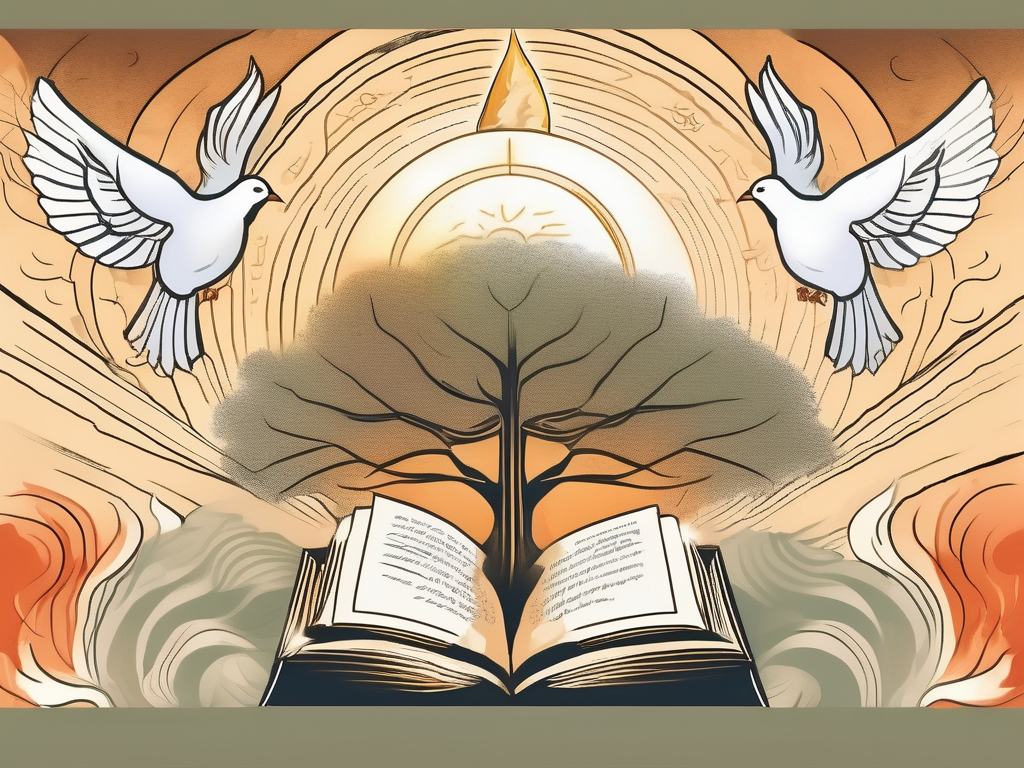Isaiah holds a significant place in Judaism, serving as both a prophet and a spiritual guide. Understanding his role within the Jewish faith requires delving into the various aspects of his prophetic status and the influence he had on Jewish theology. Let’s explore Isaiah’s significance and the reasons why he continues to be revered today.
Understanding the Role of Isaiah in Judaism
At the heart of Isaiah’s identity is his status as a prophet. In Jewish tradition, prophets are seen as individuals through whom God communicates divine messages to the people. Isaiah’s prophetic calling bestowed upon him the responsibility of delivering God’s words and providing spiritual guidance to the Jewish community.
Isaiah’s prophetic status is highly revered within Judaism. He is recognized as one of the major prophets, alongside figures such as Moses and Jeremiah. His prophecies are documented in the Book of Isaiah, an essential scripture within the Jewish canon.
Isaiah’s Prophetic Status
Isaiah’s role as a prophet was not merely limited to relaying messages from God. He was also a spiritual leader and a voice of moral conscience for the Jewish people. Through his prophecies, Isaiah challenged the people to examine their actions, repent for their sins, and seek righteousness. His words served as a reminder of the covenant between God and the Jewish people, urging them to remain faithful and obedient.
Isaiah’s prophetic calling was not without its challenges. He faced opposition and rejection from those who were resistant to his message. However, Isaiah remained steadfast in his mission, faithfully delivering God’s words even in the face of adversity.
Isaiah’s Influence on Jewish Theology
The teachings and messages conveyed by Isaiah had a profound impact on the development of Jewish theology. His prophecies emphasized the importance of faith, repentance, and righteousness, urging the people to strive for spiritual renewal and social justice.
Isaiah’s words resonated with the Jewish community, providing them with guidance and inspiration. His prophecies were not only relevant to the historical context in which he lived but also carried timeless truths that continue to resonate with believers today.
Additionally, Isaiah’s visionary insight into the future, particularly regarding the coming of the Messiah and the end times, shaped Jewish expectations and provided a foundation for messianic hope. His prophecies served as a source of comfort during times of trial and tribulation, reminding the Jewish people of God’s ultimate plan for redemption.
Isaiah’s influence extends beyond the realm of theology. His words have inspired countless individuals to pursue justice, compassion, and righteousness. His teachings continue to be studied and revered, serving as a guiding light for those seeking a deeper understanding of their faith.
The Book of Isaiah: An Overview
To gain a comprehensive understanding of Isaiah’s significance, it is essential to explore the structure, content, and major themes present within the Book of Isaiah.
The Book of Isaiah is a profound and captivating piece of literature that has captivated readers for centuries. It is divided into 66 chapters and can be categorized into three distinct sections, each offering unique insights into the human condition and our relationship with the divine.
The Structure and Content of the Book of Isaiah
The first section of the Book of Isaiah focuses on messages of judgment and warning to the Israelites. Isaiah, a prophet of God, passionately urges the people to turn away from idolatry and injustice. He exposes the consequences of their actions and implores them to seek righteousness and justice. Through his words, Isaiah challenges the Israelites to examine their hearts and align their lives with God’s will.
The second section of the book contains prophecies of comfort and restoration. In the midst of despair and turmoil, Isaiah brings a message of hope. He reassures the people of God’s mercy and faithfulness, promising them that their suffering will not last forever. Isaiah’s words offer solace to those who are weary, reminding them that God is with them even in their darkest moments.
Finally, the third section of the Book of Isaiah addresses future events and incorporates messianic prophecies. Isaiah paints a vivid picture of a future where justice and righteousness prevail. He foretells the coming of a Messiah, a savior who will bring salvation and establish an everlasting kingdom. These prophecies serve as a beacon of hope, reminding the Israelites that their story is part of a larger narrative orchestrated by a loving and sovereign God.
Within these chapters, Isaiah skillfully employs various literary devices to convey his message with eloquence and impact. His use of vivid imagery allows readers to visualize the scenes he describes, making his words come alive. Powerful metaphors and poetic language evoke deep emotions and stir the imagination, leaving a lasting impression on those who engage with his writings.
Major Themes in the Book of Isaiah
Throughout the Book of Isaiah, several recurring themes emerge, offering profound insights into the human experience and our relationship with God.
One prominent theme is the call for social justice and care for the marginalized. Isaiah emphasizes the importance of treating others with fairness and compassion, reminding the Israelites that their relationship with God is inseparable from their treatment of their fellow human beings. He challenges them to dismantle systems of oppression and to actively pursue justice and righteousness in their society.
Another significant theme is the promise of salvation and redemption. Isaiah proclaims hope during times of darkness, assuring the people that God will deliver them from their suffering and restore them to a state of peace and prosperity. His words offer comfort to those who are burdened, reminding them that their pain is not in vain and that God’s ultimate plan for their lives is one of restoration and renewal.
These themes resonate deeply within Jewish theology, shaping the understanding of God’s character and His covenant relationship with His chosen people. The Book of Isaiah serves as a reminder that God is intimately involved in the affairs of humanity, offering guidance, comfort, and hope in every season of life.
Isaiah’s Prophecies and Their Significance
Isaiah’s prophecies hold immense historical and theological importance within Judaism. They touch upon themes of messianic hope and provide insights into the nature of the end times.
Isaiah, often referred to as the “prophet of hope,” lived during a tumultuous period in Israel’s history. He witnessed the rise and fall of kings, the threat of foreign invasions, and the exile of his people. In the midst of these challenges, Isaiah’s prophecies emerged as a beacon of hope and a reminder of God’s faithfulness.
One of the key aspects of Isaiah’s prophecies is their focus on the coming of the Messiah. These prophecies describe the future arrival of a divinely anointed figure who would bring salvation and establish a reign of peace. They played a pivotal role in shaping Jewish messianic expectations and continue to inspire hope for a messianic age.
Prophecies about the Messiah
The descriptions of the Messiah in Isaiah’s prophecies are rich in symbolism and imagery. They portray a leader characterized by righteousness, wisdom, and divine favor. This prophetic anticipation lays the groundwork for the future belief in the coming of the Messiah.
Isaiah 9:6 beautifully captures the essence of the Messiah, stating, “For to us a child is born, to us a son is given, and the government will be on his shoulders. And he will be called Wonderful Counselor, Mighty God, Everlasting Father, Prince of Peace.” This verse highlights the multifaceted nature of the Messiah and his role as a source of wisdom, strength, and peace.
Isaiah’s prophecies about the Messiah also provide glimpses into the mission and purpose of this anointed figure. They speak of his role in bringing justice, healing the brokenhearted, and setting the captives free. These prophecies serve as a reminder of God’s plan for redemption and restoration.
Prophecies about the End Times
In addition to his prophecies about the Messiah, Isaiah also touches upon the end times, envisioning a future era of peace and harmony. These prophecies paint a picture of a restored world, free from suffering and strife, where all nations will come together in worship and unity.
Isaiah 11:6 beautifully describes this future reality, stating, “The wolf will live with the lamb, the leopard will lie down with the goat, the calf and the lion and the yearling together; and a little child will lead them.” This imagery of predator and prey living in harmony reflects the transformative power of God’s kingdom.
By emphasizing the ultimate triumph of righteousness and the ultimate defeat of evil, Isaiah’s prophecies provide comfort and inspire faith in God’s plan for the world’s redemption. They remind us that even in the midst of darkness and uncertainty, there is hope for a future where peace and justice prevail.
Isaiah’s prophecies continue to resonate with believers today, serving as a reminder of God’s faithfulness and the ultimate fulfillment of His promises. They encourage us to hold fast to our hope in the Messiah and to actively participate in bringing about God’s kingdom on earth.
Isaiah’s Legacy in Judaism
Isaiah’s teachings continue to impact Judaism to this day, leaving a lasting legacy within the faith.
Interpretations of Isaiah’s Teachings
Over the centuries, scholars, theologians, and Jewish thinkers have offered various interpretations of Isaiah’s teachings and prophecies. These interpretations have contributed to the rich tapestry of Jewish thought, ensuring Isaiah’s influence endures through ongoing study and exploration of his words.
Isaiah’s Impact on Jewish Liturgy and Rituals
Isaiah’s words have found their way into Jewish liturgy and rituals, further solidifying his role in Jewish spiritual life. Passages from the Book of Isaiah are frequently recited during synagogue services, commemorations, and festivals, grounding the community in the wisdom and hope contained within his prophecies.
Controversies and Debates Surrounding Isaiah
Despite the widespread reverence for Isaiah, controversial aspects surrounding his identity and the historical accuracy of his writings have been subjects of scholarly debate.
Authorship of the Book of Isaiah
Some scholars question whether all portions of the Book of Isaiah were penned by the same individual. This debate has led to theories proposing the existence of multiple authors or later additions to the original text.
However, irrespective of authorship debates, the Book of Isaiah’s spiritual and theological significance remains unchanged, inviting readers to engage with its profound teachings.
Historical Accuracy of Isaiah’s Prophecies
The historical accuracy of Isaiah’s prophecies has also been a topic of discussion among scholars. Some argue that certain prophecies could have been composed after the events they purportedly predict.
However, within Jewish tradition, the enduring belief in the divine inspiration and significance of Isaiah’s prophecies persists, anchoring faith in the eternal message rather than solely relying on historical analysis.
In conclusion, Isaiah plays a crucial role within Judaism, serving as a prophet whose messages continue to inspire and guide. His prophetic status, influence on Jewish theology, and significant prophecies all contribute to his enduring legacy within the faith. As the teachings of Isaiah are explored and interpreted, they enrich Jewish liturgy, rituals, and theological discourse, providing a foundation for spiritual growth and fostering hope for the future.












